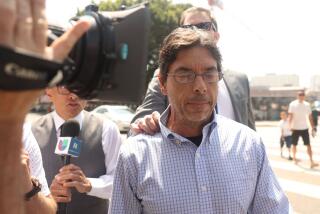Jackson’s physician charged with involuntary manslaughter
- Share via
Los Angeles prosecutors filed a long-anticipated involuntary manslaughter charge against Michael Jackson’s personal physician Monday as the coroner’s office made public a report concluding that the care the singer received in the final hours of his life violated accepted medical standards.
Dr. Conrad Murray, a cardiologist hired to care for Jackson during the pop star’s ambitious comeback attempt last year, pleaded not guilty in a courtroom near Los Angeles International Airport packed with international media and members of the entertainer’s family. Outside, a handful of fans held signs and wore T-shirts reading “Justice for Michael.”
The 51-page coroner’s office report of Jackson’s June 25 death suggests that to prove manslaughter, prosecutors, who worked closely with the office’s medical investigators and experts in building a criminal case, will focus on Murray’s use of the operating-room anesthetic propofol as a sleep aid.
The coroner’s office previously said Jackson died from “acute propofol intoxication” in combination with the use of sedatives. The report released Monday went further, describing the level of anesthetic as enough to render a patient unconscious for “major surgery.”
Murray told investigators that Jackson, 50, was a chronic insomniac who had depended for years on propofol -- a white liquid the singer called “milk” -- to sleep, according to police affidavits filed in court. But an anesthesiologist consulted by the coroner’s office wrote in the report that she knew of “NO reports of its use for insomnia relief.”
“The only reports of its use in homes are cases of fatal abuse . . . suicide, murder and accident,” Dr. Selma Calmes wrote.
She added that because of the risk of respiratory or cardiac side effects, propofol should be administered only by anesthesiologists or others trained to recognize those complications. “Full patient monitoring is required any time propofol is given,” she wrote.
The setup in Jackson’s bedroom did not include proper monitoring or precise dosing equipment, and an oxygen tank at his bedside was empty, according to the report.
In addition, Murray acknowledged leaving Jackson alone and under the influence of the drug for what he said was a two-minute visit to the restroom, according to police affidavits.
Whether Murray was negligent in administering propofol to Jackson will probably be the central dispute in his involuntary manslaughter prosecution, experts say.
Prosecutors do not have to prove Murray acted with malice or intent, only that the death occurred during an “unlawful act not amounting to a felony” or during a lawful act performed “without due caution and circumspection.” It is the least serious homicide charge available to prosecutors, its maximum punishment of four years in prison far less than the life sentence for murder or the 11 years for voluntary manslaughter.
Murray remained silent through the hearing, other than to answer “yes” in a soft voice several times when the judge asked him if he understood the terms of his $75,000 bail and his right to a speedy trial.
Outside court, his attorney, Ed Chernoff, predicted that his client would be acquitted.
“If we get the right jury, the right result will occur,” he said.
Chernoff did not address specific details about the morning Jackson died, but he did briefly dispute the coroner’s contention that the oxygen tank found in the singer’s bedroom was depleted and that Murray didn’t have appropriate medical equipment on hand.
“We’re going to tell you right now that that’s not the case,” he said.
Sheriff’s deputies whisked Murray into the courthouse through a crush of camera crews and past a small group of protesters, some of whom shouted “murderer!” as he passed. Chernoff said his client was shocked by the display. He said the doctor considered Jackson a friend and has been visiting his grave since the pop star’s burial.
“This has been a nightmare for him for many different reasons,” Chernoff said. “One of the reasons is that he lost a friend.”
Murray, who is licensed in California, Nevada and Texas, plans to resume seeing patients in Las Vegas later this week, his lawyer said, but his future in medicine remains unclear. The California Medical Board plans to ask a judge to suspend his license when he returns to court in April, a board spokeswoman said, and the terms of his bail specifically forbid him from prescribing propofol or other heavy sedatives.
“I don’t want you sedating people,” Los Angeles County Superior Court Judge Keith L. Schwartz told Murray.
Times staff writer Richard Winton contributed to this report.
More to Read
Sign up for Essential California
The most important California stories and recommendations in your inbox every morning.
You may occasionally receive promotional content from the Los Angeles Times.
















